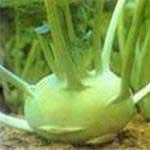 If you have excessive phlegm, you can use the stem or leaves of the kohlrabi, cut into pieces, and sauté them in sesame oil. For painful boils, mashing kohlrabi and applying it to the painful area can also be very effective.
If you have excessive phlegm, you can use the stem or leaves of the kohlrabi, cut into pieces, and sauté them in sesame oil. For painful boils, mashing kohlrabi and applying it to the painful area can also be very effective.
Kohlrabi, also known as Brassica oleracea var. gongylodes, has round leaves and is a member of the cabbage family. It has a cool nature and a slightly sweet and bitter taste. Its main components include albumin, sugars, crude fiber, calcium, phosphorus, iron, vitamin C, and nicotinic acid. The leaves can be used for medicinal purposes.
Benefits: It helps dissolve phlegm, quenches thirst, aids digestion, detoxifies, promotes urination, reduces inflammation, and supports stomach health. It is mainly used for cloudy urine, blood in stool, unexplained boils, spleen deficiency with excess heat, cold stomach with excessive phlegm, and fainting due to wind strokes.
Usage: It can be used in soups, eaten raw, or cooked with meat. It can also be mashed and applied externally or ground into powder for inhalation.
Contraindications: Excessive consumption can lead to energy loss and blood deficiency.
Treatments:
1. Excessive phlegm and shortness of breath:
– Clean and cut the stem or leaves of the kohlrabi into pieces. Sauté them with sesame oil to make a soup. Consume one to two times a day.
– Peel the kohlrabi, mash it, and mix it with honey to consume with boiled water.
2. Cold stomach with excessive phlegm: Cook kohlrabi with goat meat and eat.
3. Spleen deficiency with excess heat, dry mouth, and thirst: Cut kohlrabi into pieces, mash it, mix with sugar and boiled water, and eat it raw.
4. Enlarged cysts: Cut kohlrabi and fresh herbs into pieces, mash them well, and apply externally.
5. Unexplained boils: Mash kohlrabi and apply it to the painful area. Drink the juice after mashing the kohlrabi.

















































